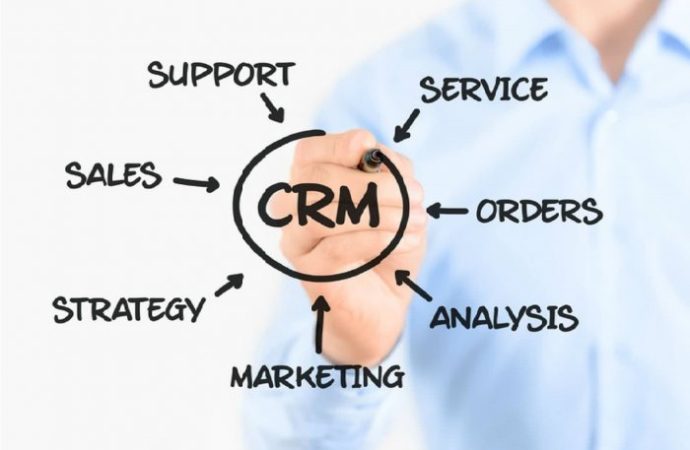In the ever-evolving business landscape, AI CRM solutions have emerged as a pivotal tool for enhancing decision-making processes. The integration of artificial intelligence in customer relationship management systems has revolutionized the way businesses interact with their customers, analyze data, and make strategic decisions. AI CRM solutions enhance decision-making processes by offering businesses the ability to
AI-driven insights lead to smarter business strategies by providing a deeper understanding of customer behavior and preferences. By analyzing customer interactions, purchase history, and feedback, AI CRM systems can generate insights that help businesses tailor their marketing efforts, improve customer service, and develop products that meet the evolving needs of their customers. This level of insight enables businesses to create more personalized experiences for their customers, fostering loyalty and increasing customer satisfaction. In essence, AI CRM solutions empower businesses to make smarter decisions by equipping them with the tools and insights needed to stay ahead of the competition and drive growth.
The Role of AI in Modern CRM

Image by Yandex.com
The role of AI in modern CRM cannot be overstated. AI enhances data analysis and customer insights by automating the process of data collection and interpretation. Traditional CRM systems often require manual input and analysis, which can be time-consuming and prone to errors. However, AI-driven CRM systems can automatically gather data from various sources, analyze it in real-time, and provide actionable insights that help businesses understand their customers better. This enhanced data analysis capability allows businesses to gain a comprehensive view of their customers, enabling them to make informed decisions that improve customer satisfaction and drive business success.
AI-driven automation streamlines customer relationship management by automating routine tasks and processes. In traditional CRM systems, tasks such as data entry, lead scoring, and customer segmentation often require significant time and effort from employees. However, AI can automate these tasks, freeing up employees to focus on more strategic activities that add value to the business. By streamlining processes, AI-driven CRM systems improve efficiency, reduce operational costs, and enhance the overall customer experience. This automation not only saves time but also ensures that tasks are completed accurately and consistently, leading to better decision-making and improved business outcomes.
Enhancing Customer Insights with AI
AI-driven analytics for deeper customer understanding is a game-changer for businesses looking to enhance their customer insights. By leveraging AI algorithms, businesses can analyze customer data at a granular level, uncovering patterns and trends that were previously hidden. This deeper understanding of customer behavior allows businesses to tailor their marketing strategies, improve customer service, and develop personalized experiences that resonate with their target audience. AI-driven analytics provide businesses with the tools they need to understand their customers on a deeper level, enabling them to make informed decisions that drive customer satisfaction and loyalty.
Predictive insights enhance decision-making accuracy by providing businesses with the ability to anticipate customer needs and preferences. By analyzing historical data and identifying patterns, AI-driven CRM systems can generate predictive insights that help businesses forecast future trends and make proactive decisions. This predictive capability allows businesses to stay ahead of the competition by anticipating market changes and adapting their strategies accordingly. By leveraging predictive insights, businesses can make more accurate decisions that align with customer expectations and drive business success.
Automating Routine CRM Tasks
Streamlining processes with AI-driven task automation is a key benefit of modern CRM systems. In many organizations, routine CRM tasks such as data entry, lead scoring, and customer segmentation can be time-consuming and prone to errors. However, AI-driven CRM systems can automate these tasks, freeing up employees to focus on more strategic activities that add value to the business. By automating routine tasks, businesses can improve efficiency, reduce operational costs, and enhance the overall customer experience. This automation not only saves time but also ensures that tasks are completed accurately and consistently, leading to better decision-making and improved business outcomes.
Enhancing decision-making through automated CRM functions is another significant advantage of AI-driven CRM systems. By automating routine tasks, businesses can focus on analyzing data and generating insights that inform strategic decisions. Automated CRM functions provide businesses with real-time data and insights, enabling them to make informed decisions that drive customer satisfaction and business success. By leveraging AI-driven automation, businesses can streamline their processes, improve efficiency, and enhance their decision-making capabilities, ultimately leading to better business outcomes.
Predictive Analytics for Smarter Decisions

Image by Yandex.com
Predictive analytics enhances AI CRM decision-making processes by providing businesses with the ability to anticipate customer needs and preferences. By analyzing historical data and identifying patterns, AI-driven CRM systems can generate predictive insights that help businesses forecast future trends and make proactive decisions. This predictive capability allows businesses to stay ahead of the competition by anticipating market changes and adapting their strategies accordingly. By leveraging predictive analytics, businesses can make more accurate decisions that align with customer expectations and drive business success.
AI CRM leverages predictive analytics for data-driven insights that inform strategic decision-making. By analyzing customer data and identifying patterns, AI-driven CRM systems can generate insights that help businesses understand their customers better and make informed decisions that drive customer satisfaction and loyalty. Predictive analytics provides businesses with the tools they need to anticipate customer needs, adapt their strategies, and make data-driven decisions that lead to business success. By leveraging predictive analytics, businesses can enhance their decision-making capabilities and drive better business outcomes.
Improving Customer Engagement through AI
AI enhances customer engagement via personalized interactions by providing businesses with the tools they need to understand their customers better and tailor their interactions accordingly. By analyzing customer data and identifying patterns, AI-driven CRM systems can generate insights that help businesses create personalized experiences that resonate with their target audience. Personalized interactions foster customer loyalty and increase customer satisfaction, ultimately leading to better business outcomes. By leveraging AI-driven CRM systems, businesses can enhance their customer engagement efforts and drive business success.
AI-driven CRM provides data-driven insights for smarter decisions by analyzing customer data and generating insights that inform strategic decision-making. By leveraging AI algorithms, businesses can gain a deeper understanding of their customers and make informed decisions that drive customer satisfaction and loyalty. Data-driven insights provide businesses with the tools they need to anticipate customer needs, adapt their strategies, and make informed decisions that lead to business success. By leveraging AI-driven CRM systems, businesses can enhance their decision-making capabilities and drive better business outcomes.
Integrating AI with Existing CRM Systems
Enhancing customer insights with AI-driven analytics is a key benefit of integrating AI with existing CRM systems. By leveraging AI algorithms, businesses can analyze customer data at a granular level, uncovering patterns and trends that were previously hidden. This deeper understanding of customer behavior allows businesses to tailor their marketing strategies, improve customer service, and develop personalized experiences that resonate with their target audience. AI-driven analytics provide businesses with the tools they need to understand their customers on a deeper level, enabling them to make informed decisions that drive customer satisfaction and loyalty.
Automating routine tasks for improved efficiency is another significant advantage of integrating AI with existing CRM systems. In many organizations, routine CRM tasks such as data entry, lead scoring, and customer segmentation can be time-consuming and prone to errors. However, AI-driven CRM systems can automate these tasks, freeing up employees to focus on more strategic activities that add value to the business. By automating routine tasks, businesses can improve efficiency, reduce operational costs, and enhance the overall customer experience. This automation not only saves time but also ensures that tasks are completed accurately and consistently, leading to better decision-making and improved business outcomes.
Future Trends in AI CRM Solutions

Image by Yandex.com
AI-driven personalization enhances customer engagement by providing businesses with the tools they need to understand their customers better and tailor their interactions accordingly. By analyzing customer data and identifying patterns, AI-driven CRM systems can generate insights that help businesses create personalized experiences that resonate with their target audience. Personalized interactions foster customer loyalty and increase customer satisfaction, ultimately leading to better business outcomes. As AI CRM solutions continue to evolve, businesses can expect even more sophisticated personalization capabilities that enhance customer engagement and drive business success.
Predictive analytics revolutionize decision-making in CRM by providing businesses with the ability to anticipate customer needs and preferences. By analyzing historical data and identifying patterns, AI-driven CRM systems can generate predictive insights that help businesses forecast future trends and make proactive decisions. This predictive capability allows businesses to stay ahead of the competition by anticipating market changes and adapting their strategies accordingly. As predictive analytics continue to advance, businesses can expect even more accurate and actionable insights that enhance their decision-making capabilities and drive better business outcomes.
















